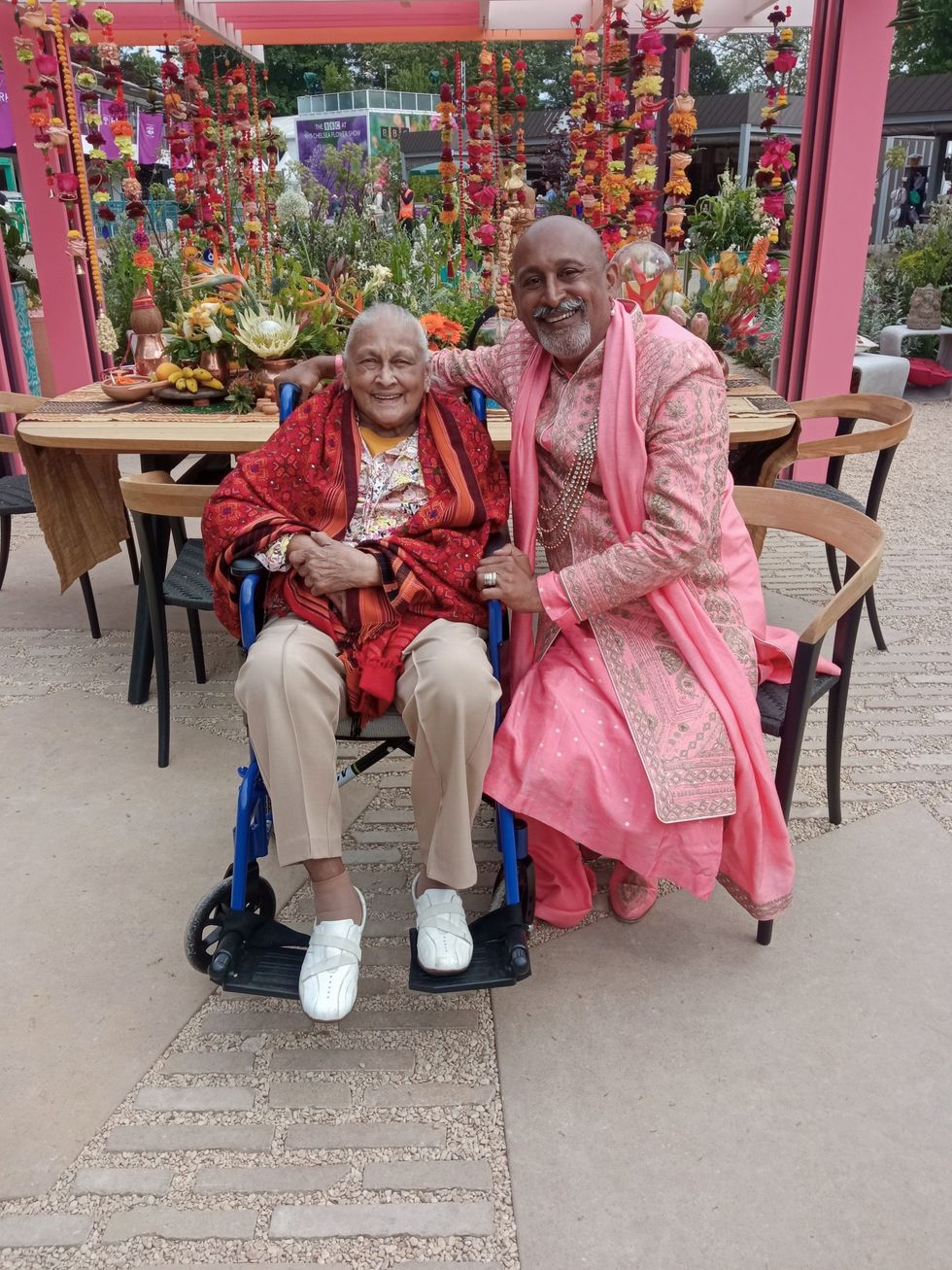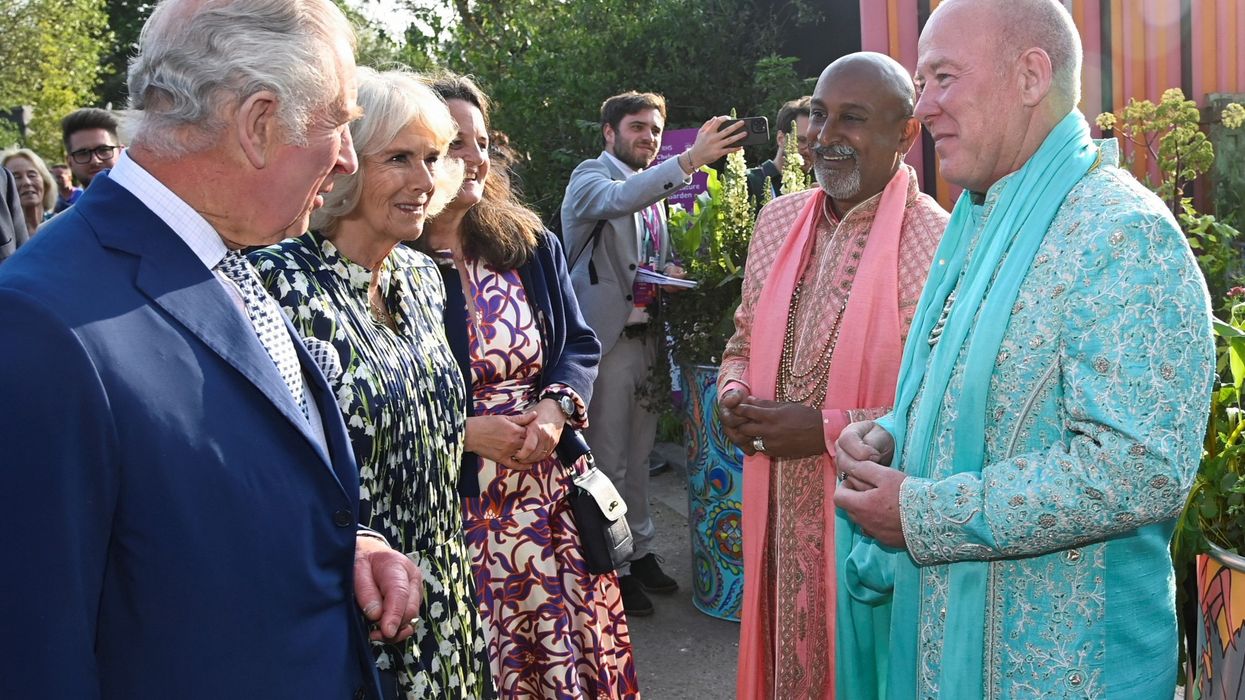Landscape designer Manoj Malde has spoken of the highlights of the RHS-Eastern Eye Garden of Unity which was unveiled on Monday (22) at the Chelsea Flower Show.
“It’s a very colourful garden – pinks, oranges with hints of aubergine and alabaster,” said Malde.
Even amidst the riot of colour, his creation stood out – and attracted a great deal of favourable attention from gardening critics and members of the public.
He spoke on a day when King Charles and Queen Camilla visited the Chelsea Flower and kept up the tradition that was long maintained by Queen Elizabeth, patron of the Royal Horticultural Society. And the Princess of Wales attended a picnic for 100 schoolchildren.
The RHS has minted a new Elizabeth Medal of Honour “with the gracious assent of His Majesty King Charles III in perpetual remembrance of Her Majesty’s glorious reign”.
At the RHS president’s lunch for 400 guests, Keith Weed stressed: “I’d like to just start by saying this is the 101st RHS Chelsea Flower Show.”
He added it was the first to be led by its director general Clare Matterson, whose new strategy includes making the RHS, which has over 600,000 members, a more diverse organisation.
Guests saw a video in which Matterson said: “Saving the world starts at our fingertips…and plants are at the heart of any garden. We nurture them wherever they are. At the RHS, we believe that if you have plants, you’re a gardener.
And the world is facing multiple crises from the climate emergency to biodiversity loss to huge economic and social upheavals. And we know that gardening can be integral to helping to address these. And this is why today we’re launching our new strategy to be there for everyone on their lifelong adventure with gardening.”
Matterson, who has worked in close partnership with Eastern Eye to bring about the Garden of Unity, added at the end of her video: “We know that everyone’s journey with gardening is different. And we want to be there for everyone at every stage on their lifelong journey with gardening.
Few activities bring so many benefits to so many people. So that’s why we believe that from beginners to experienced horticulturalists, from houseplants, local gardens to big national gardens, we believe that everybody should have the right to have access to gardening. And that gardening should be embraced as a way of life for everybody. And that’s why saving the world really does start at our fingertips.”
The keynote address was delivered by the US ambassador to the UK, Jane Hartley, whose residence, Winfield House, in Regent’s Park, is said to have the biggest garden in London after Buckingham Palace.
After a year in the post, she said she had seen English seasons change. “I love all the seasons, but spring is particularly special. And it’s more special here than any place in the world. Flowers tumble out of window boxes and crawl up brick walls. (As) you walk down the street, you’ll see an older woman plant foxgloves.”
Malde said many celebrity guests had been drawn to the Garden of Unity, among them the actress Dame Judi Dench and also Thérèse Coffey, secretary of state for environment, food and rural affairs, who is expecting to accompany Rishi Sunak to the G20 summit in India in September this year.
“We had a conversation about how we can make gardening and horticulture more inclusive and encourage different communities to take part, not just in RHS shows and gardens, but actually gardening as a whole and how they can enjoy it, learn different techniques of gardening, how to grow things, and genuinely become part of the wonderful industry of horticulture in this country,” said Malde.

His very happy and proud mother, Suryakala, was alongside her son, who was dressed in his wedding finery because on Monday morning in the Garden of Unity he had married his partner, Clive Gillmor, in what has been hailed as a first for Chelsea.
In fact, King Charles and Queen Camilla dropped by the Garden of Unity to meet the newly married couple.
“They were lovely,” said Malde.
The meeting was apparently at Charles’s request.
On Tuesday evening, guests were invited to the formal opening of the RHS-Eastern Eye Garden of Unity.
Drawing attention to some of the highlights in the garden, Malde said: “We’ve got some artichokes here, we’re growing sweet corn, we’ve got chillies in the garden. We’ve also got aubergines – nothing like a lovely aubergine curry. We’ve got kohlrabi, lettuce and chard. We’ve even got marigolds – marigolds are really important in Hindu worship and festivals.
“And peas! I love growing peas and there’s nothing like a fresh pea curry. I’ve actually got some of those growing in the recycled oil drums. We’ve got these lovely embroidered throw cushions that represent artisan skills from India. We’ve got these lovely garlands hanging from the pergola.”
Malde said most Eastern Eye readers “will be familiar with hanging limes and chillies at your front door to keep the evil eye away and we’ve done that also on the pergola.”
He said his famous florist friend, Simon Lycett, “has curated the most amazing table. We’ve got beautiful, copper kalashes. We’ve got coriander, we’ve got okra – bhindi to most of you. We’ve got small bananas and pineapple. We’ve got fruit and vegetables from around the world. We’ve also got saffron mangoes – they are my favourite.
“We’ve got calendula – you can use them in your cooking. And then we’ve got things like Birds of Paradise, and Red Hot Pokers. We’ve even got flowers from a radish, and Eryngium as well. Alliums are here, and bits of fennel – a superb array of a mix of them.
“And one thing that I must point out is we’ve got the little deities of Ganesh, Saraswati, Lakshmi, we’ve even got the Shiva Lingam. There’s also coconut on a copper kalash. And we’ve got this most beautiful granite statue sitting on a stone – and it is Ganesh. Now, as we all know, in Hindu worship – especially weddings – a wedding doesn’t take place without the presence of Ganesh.
“We’ve even got a Rajasthani door, which I’ve managed to borrow from one of my suppliers. So it’s so lovely to be able to have different parts and different flavours of my heritage in the garden.”
He has plant five trees in the garden – “it’s one species, but we have five of them. The reason why I’ve incorporated these trees into the garden is because when I was at school (in Mombasa in Kenya), for my religious education exams, I studied Islam. These trees represent the five pillars of Islam. My trees also represent love, kindness, unity, understanding and empathy.”




